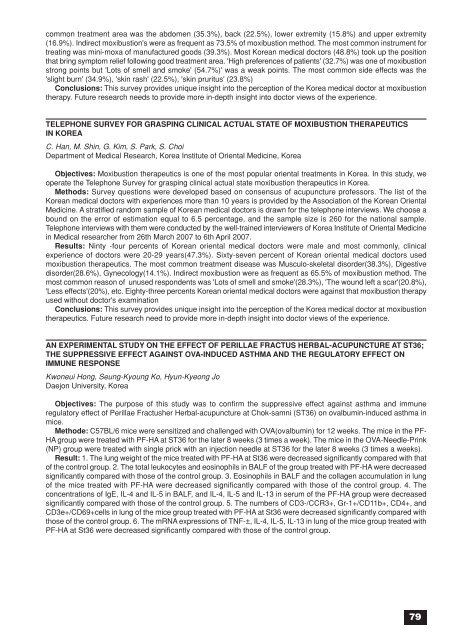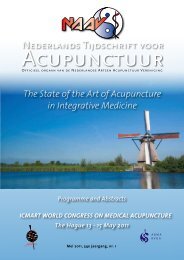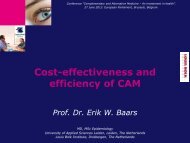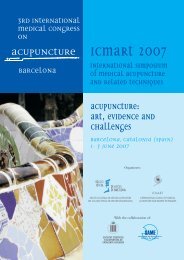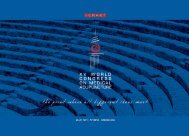Congress Abstracts full PDF - International Council of Medical ...
Congress Abstracts full PDF - International Council of Medical ...
Congress Abstracts full PDF - International Council of Medical ...
You also want an ePaper? Increase the reach of your titles
YUMPU automatically turns print PDFs into web optimized ePapers that Google loves.
common treatment area was the abdomen (35.3%), back (22.5%), lower extremity (15.8%) and upper extremity<br />
(16.9%). Indirect moxibustion's were as frequent as 73.5% <strong>of</strong> moxibustion method. The most common instrument for<br />
treating was mini-moxa <strong>of</strong> manufactured goods (39.3%). Most Korean medical doctors (48.8%) took up the position<br />
that bring symptom relief following good treatment area. 'High preferences <strong>of</strong> patients' (32.7%) was one <strong>of</strong> moxibustion<br />
strong points but 'Lots <strong>of</strong> smell and smoke' (54.7%)' was a weak points. The most common side effects was the<br />
'slight burn' (34.9%), 'skin rash' (22.5%), 'skin pruritus' (23.8%)<br />
Conclusions: This survey provides unique insight into the perception <strong>of</strong> the Korea medical doctor at moxibustion<br />
therapy. Future research needs to provide more in-depth insight into doctor views <strong>of</strong> the experience.<br />
TELEPHONE SURVEY FOR GRASPING CLINICAL ACTUAL STATE OF MOXIBUSTION THERAPEUTICS<br />
IN KOREA<br />
C. Han, M. Shin, G. Kim, S. Park, S. Choi<br />
Department <strong>of</strong> <strong>Medical</strong> Research, Korea Institute <strong>of</strong> Oriental Medicine, Korea<br />
Objectives: Moxibustion therapeutics is one <strong>of</strong> the most popular oriental treatments in Korea. In this study, we<br />
operate the Telephone Survey for grasping clinical actual state moxibustion therapeutics in Korea.<br />
Methods: Survey questions were developed based on consensus <strong>of</strong> acupuncture pr<strong>of</strong>essors. The list <strong>of</strong> the<br />
Korean medical doctors with experiences more than 10 years is provided by the Association <strong>of</strong> the Korean Oriental<br />
Medicine. A stratified random sample <strong>of</strong> Korean medical doctors is drawn for the telephone interviews. We choose a<br />
bound on the error <strong>of</strong> estimation equal to 6.5 percentage, and the sample size is 260 for the national sample.<br />
Telephone interviews with them were conducted by the well-trained interviewers <strong>of</strong> Korea Institute <strong>of</strong> Oriental Medicine<br />
in <strong>Medical</strong> researcher from 26th March 2007 to 6th April 2007.<br />
Results: Ninty -four percents <strong>of</strong> Korean oriental medical doctors were male and most commonly, clinical<br />
experience <strong>of</strong> doctors were 20-29 years(47.3%). Sixty-seven percent <strong>of</strong> Korean oriental medical doctors used<br />
moxibustion therapeutics. The most common treatment disease was Musculo-skeletal disorder(38.3%), Digestive<br />
disorder(28.6%), Gynecology(14.1%). Indirect moxibustion were as frequent as 65.5% <strong>of</strong> moxibustion method. The<br />
most common reason <strong>of</strong> unused respondents was 'Lots <strong>of</strong> smell and smoke'(28.3%), 'The wound left a scar'(20.8%),<br />
'Less effects'(20%), etc. Eighty-three percents Korean oriental medical doctors were against that moxibustion therapy<br />
used without doctor's examination<br />
Conclusions: This survey provides unique insight into the perception <strong>of</strong> the Korea medical doctor at moxibustion<br />
therapeutics. Future research need to provide more in-depth insight into doctor views <strong>of</strong> the experience.<br />
AN EXPERIMENTAL STUDY ON THE EFFECT OF PERILLAE FRACTUS HERBAL-ACUPUNCTURE AT ST36;<br />
THE SUPPRESSIVE EFFECT AGAINST OVA-INDUCED ASTHMA AND THE REGULATORY EFFECT ON<br />
IMMUNE RESPONSE<br />
Kwoneui Hong, Seung-Kyoung Ko, Hyun-Kyeong Jo<br />
Daejon University, Korea<br />
Objectives: The purpose <strong>of</strong> this study was to confirm the suppressive effect against asthma and immune<br />
regulatory effect <strong>of</strong> Perillae Fractusher Herbal-acupuncture at Chok-samni (ST36) on ovalbumin-induced asthma in<br />
mice.<br />
Methode: C57BL/6 mice were sensitized and challenged with OVA(ovalbumin) for 12 weeks. The mice in the PF-<br />
HA group were treated with PF-HA at ST36 for the later 8 weeks (3 times a week). The mice in the OVA-Needle-Prink<br />
(NP) group were treated with single prick with an injection needle at ST36 for the later 8 weeks (3 times a weeks).<br />
Result: 1. The lung weight <strong>of</strong> the mice treated with PF-HA at St36 were decreased significantly compared with that<br />
<strong>of</strong> the control group. 2. The total leukocytes and eosinophils in BALF <strong>of</strong> the group treated with PF-HA were decreased<br />
significantly compared with those <strong>of</strong> the control group. 3. Eosinophils in BALF and the collagen accumulation in lung<br />
<strong>of</strong> the mice treated with PF-HA were decreased significantly compared with those <strong>of</strong> the control group. 4. The<br />
concentrations <strong>of</strong> IgE, IL-4 and IL-5 in BALF, and IL-4, IL-5 and IL-13 in serum <strong>of</strong> the PF-HA group were decreased<br />
significantly compared with those <strong>of</strong> the control group. 5. The numbers <strong>of</strong> CD3-/CCR3+, Gr-1+/CD11b+, CD4+, and<br />
CD3e+/CD69+cells in lung <strong>of</strong> the mice group treated with PF-HA at St36 were decreased significantly compared with<br />
those <strong>of</strong> the control group. 6. The mRNA expressions <strong>of</strong> TNF-±, IL-4, IL-5, IL-13 in lung <strong>of</strong> the mice group treated with<br />
PF-HA at St36 were decreased significantly compared with those <strong>of</strong> the control group.<br />
79


